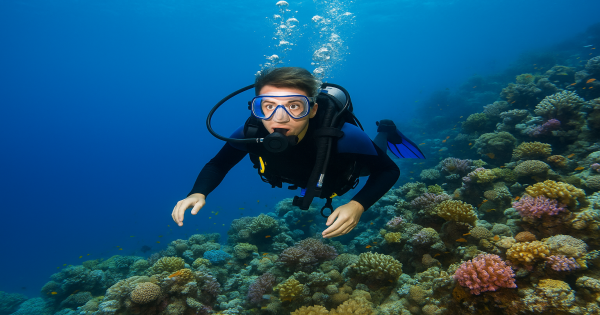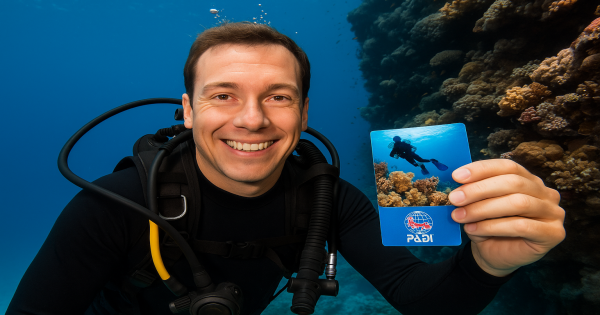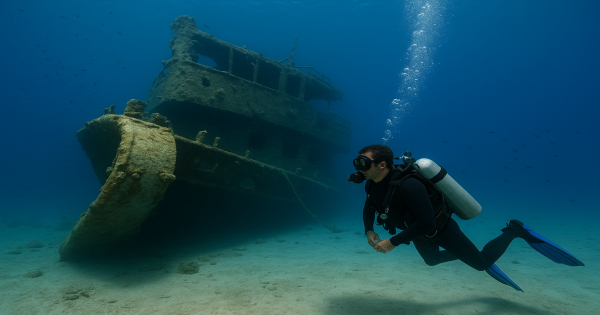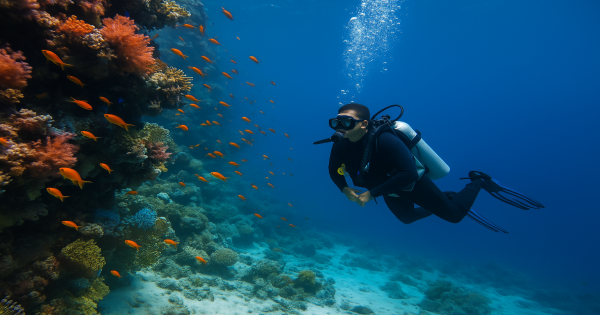Blog Details
How to Deal with Ear Problems and Pressure Underwater
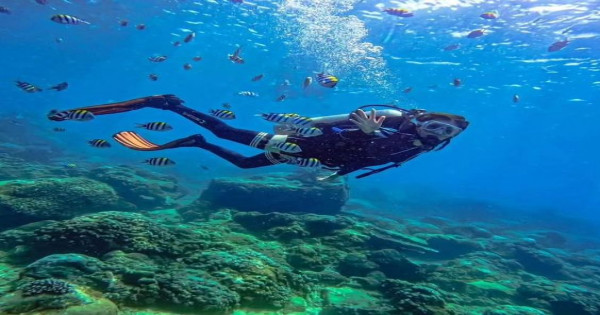
How to Deal with Ear Problems and Pressure Underwater is one of the most important aspects every diver should understand. Ear pressure issues are among the most common problems faced by divers underwater. However, there are safe methods to help you avoid this annoying problem.
If you regularly practice diving, it’s essential to understand these points to prevent ear and water pressure issues while enjoying the sport. In this interesting article from Dive With Us, we’ll introduce you to these aspects, as understanding and addressing this problem can make your diving experience safer and more enjoyable.
How to Deal with Ear Problems and Pressure Underwater
Ear pressure issues are among the most common challenges divers face, and failing to manage them properly can lead to discomfort, pain, or even serious ear injuries. Understanding how to deal with ear problems and pressure underwater is essential for ensuring a safe and enjoyable dive. By following the right techniques and precautions, divers can prevent unnecessary complications and fully enjoy their underwater adventures.
This guide will cover the science behind ear pressure, effective equalization techniques, common mistakes to avoid, and essential tips for protecting your ears while diving.
nderstanding How to Deal with Ear Problems and Pressure Underwater
Water pressure increases as you descend, and your body must adapt to these changes. The middle ear is filled with air, which remains at surface pressure unless you actively equalize it. Without proper equalization, the increasing pressure can cause pain, discomfort, or even barotrauma.
How Pressure Affects the Ears
-
At the surface: The pressure inside and outside the ear is equal, so you feel no discomfort.
-
At 10 meters: The water pressure doubles, and without equalization, your eardrum gets pushed inward.
-
At deeper depths: The pressure continues to increase, making it harder for your ears to adjust.
-
Rapid ascents: If you ascend too quickly without proper equalization, your ears may struggle to release excess pressure, leading to reverse block or barotrauma.
Understanding these principles helps divers appreciate why pressure equalization is a critical skill for safe diving and an essential part of how to deal with ear problems and pressure underwater.
Master Equalization Techniques! Learn the best methods to prevent ear pain and dive comfortably start practicing today +201092856966
Pressure Equalization Techniques for Safe Diving
To prevent ear pain and potential injury, divers must use pressure equalization techniques from the moment they start descending. These techniques are key when learning how to deal with ear problems and pressure underwater.
1. Valsalva Maneuver
This is the most commonly used technique for ear equalization.
-
How to do it: Pinch your nose, keep your mouth closed, and gently exhale.
-
What it does: Forces air into the middle ear, equalizing pressure.
-
Caution: Avoid blowing too hard, as excessive force can damage your eardrum.
2. Toynbee Maneuver
-
How to do it: Pinch your nose and swallow at the same time.
-
What it does: Opens the Eustachian tubes and allows pressure to equalize naturally.
-
Best used for: Divers who struggle with Valsalva or prefer a gentler approach.
3. Frenzel Maneuver
-
How to do it: Close your nose and throat, then make a "k" sound with the back of your tongue.
-
What it does: Directs air into the Eustachian tubes without straining the lungs.
-
Best for: Divers who have difficulty with the Valsalva method.
Additional Tips
- Use earplugs designed for diving to help reduce pressure.
- Ensure you have adequate knowledge of proper diving techniques.
- Connect with the diving community for additional tips and shared experiences.
Don’t Let Ear Problems Ruin Your Dive! Discover how to manage pressure effectively and keep your ears healthy on every dive +201092856966
When to Equalize?
-
Before you feel discomfort – start equalizing every few meters as you descend.
-
If you feel pain, stop descending – ascend slightly and try again.
-
Never force it – if you can’t equalize, do not continue diving deeper.
Using the right equalization techniques is one of the most important aspects of how to deal with ear problems and pressure underwater and ensures a more comfortable and injury-free dive.
Essential Precautions for Ear Health While Diving
While equalization techniques help manage pressure, taking care of your ears before and after a dive is just as important. Proper ear care plays a vital role in how to deal with ear problems and pressure underwater.
1. Avoid Diving When Sick
-
If you have a cold, flu, sinus infection, or ear inflammation, postpone your dive.
-
Congestion makes it harder to equalize and increases the risk of ear barotrauma.
-
Taking decongestants before a dive may help, but they can wear off mid-dive, leading to reverse block on ascent.
2. Listen to Your Body
-
If you feel discomfort or pain, ascend slightly and try equalizing again.
-
Never push through pain—it’s a warning sign that pressure is not balanced.
-
If symptoms persist after the dive, seek medical attention.
3. Avoid Rapid Ascents
-
Equalizing isn’t just for descents—ascents can cause pressure problems, too.
-
Ascend slowly and steadily to allow your ears to adjust naturally.
-
A reverse block can happen if the Eustachian tubes fail to release trapped air, causing severe discomfort.
Stay Safe Underwater! Read our expert guide on dealing with ear problems and make every dive pain-free and enjoyable +201092856966
Additional Tips to Protect Your Ears While Diving
✔ Use Specialized Earplugs – Vented diving earplugs can help regulate pressure while allowing water to enter the ear canal.
✔ Stay Hydrated – Dehydration thickens mucus in your sinuses, making equalization harder. Drink plenty of water before diving.
✔ Practice Before Diving – If you have difficulty equalizing, try practicing different techniques before getting in the water.
✔ Engage with the Diving Community – Learn from experienced divers and share techniques for managing ear pressure effectively.
Managing Ear Barotrauma and Recovery After a Dive
Even with proper precautions, some divers may still experience mild ear barotrauma due to improper equalization or rapid pressure changes. Recognizing the signs and knowing how to recover is essential for anyone learning how to deal with ear problems and pressure underwater.
If you experience symptoms like muffled hearing, ear pain, or slight dizziness after a dive, it's crucial to allow your ears time to heal. Avoid diving again until symptoms fully subside, as repeated exposure to pressure changes can worsen the condition. Applying a warm compress to the affected ear and using over-the-counter pain relievers can help reduce discomfort. Staying hydrated and chewing gum can also assist in clearing blocked Eustachian tubes.
Knowing how to deal with ear problems and pressure underwater is crucial for a safe and comfortable diving experience. By understanding how pressure affects the ears, practicing equalization techniques, and taking preventive measures, you can significantly reduce the risk of ear discomfort and injury.
